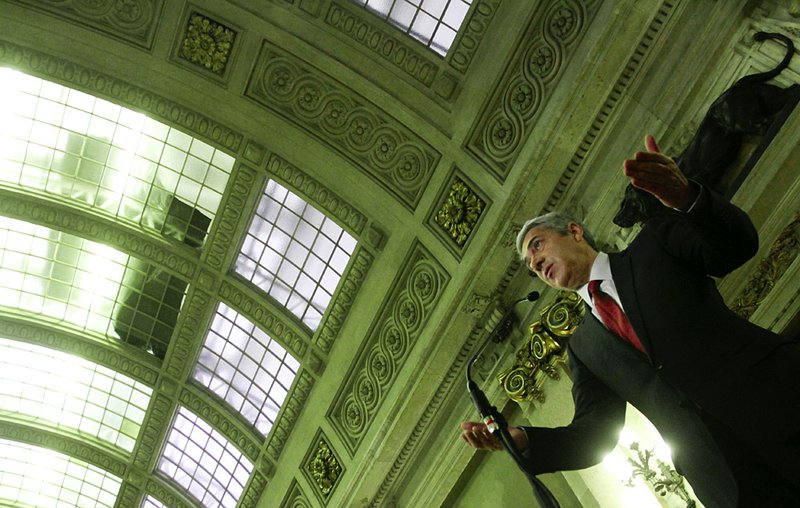LISBON, Portugal — Europe struggled mightily Friday to keep the debt crisis from spreading, as Portugal passed austerity measures to fend off the speculative trades pushing it toward a bailout and Ireland rushed to negotiate its own imminent rescue.
As Portugal and Spain insisted they will not seek outside help, Europe braced for what seems inevitable - more expensive bailouts.
The Portuguese Parliament approved an unpopular debt-reducing package, including tax increases and cuts in pay and welfare benefits. But while that helped avoid a sharper deterioration in bond markets, the sense among analysts was that the move had bought only a little time.
Adding to the pressure, Ireland’s major banks were hit with credit downgrades - one to junk-bond status - as speculation mounted that the European Union-International Monetary Fund bailout of Ireland, to be revealed within days, would require investors to take losses, a possibility earlier denied by officials.
“This confusing ‘pea-soup’ of indecision, vacillation and disunity by the EU is beginning to create unnecessarily seismic waves of fear in international bond and money markets,” said David Buik, markets analyst at BGC Partners.
http://hosted.ap.or…">European financial crisis
Yields in fiscally weak eurozone countries remained near record highs Friday, stocks slumped across the board and the 16-nation euro lost another 0.8 percent on the day to trade at $1.3244, just off two-month lows.
Portugal’s high debt and low growth have alarmed investors, but the government insists it doesn’t require an international rescue - reminiscent of claims by Greece and Ireland before their rescues.
Analysts say markets need more reassurance from EU leaders that the crisis can be stopped in Portugal and not spread to Spain, the continent’s fourth-largest economy - a scenario that would threaten the 16-nation euro currency.
The financial crisis took a step in that direction this week, as it increasingly becomes apparent that bond investors will not be pacified by austerity measures but want weak countries’ public finances to be plugged once and for all. Greece, which accepted a bailout six months ago, and Ireland are still far from being able to return to international debt markets.
Ireland continued to deal with political turmoil Friday, frightening investors with the prospect of a power vacuum even as it must pass its bailout and austerity plan.
Prime Minister Brian Cowen saw his hold on power slip another notch, as his ruling Fianna Fail party lost a special election for a long-empty seat in parliament.
The winner vowed to force Cowen from office before he can pass an emergency 2011 budget being demanded as part of the international rescue.
Ireland continued to negotiate the final details of a $113 billion EU-IMF rescue package. Bond yields rose to a new euro-era high of 9.19 percent, up from 9.02 percent the day before, as investors dumped Ireland’s debt.
The New York-based Standard & Poor’s credit ratings agency said it was lowering Anglo Irish Bank six notches to a junk-bond B grade. It also cut the ratings on Bank of Ireland one notch to BBB+, and downgraded both Allied Irish Banks and Irish Life & Permanent one notch to BBB.
The agency said Ireland “may be forced to reconsider its current supportive stance toward Anglo’s unguaranteed debt.”
“There really is a serious question as to whether Anglo Irish Bank should even have a banking license,” said Constantin Gurdgiev, a finance lecturer at Trinity College Dublin.
Portugal’s Finance Minister Fernando Teixeira dos Santos acknowledged that some in Europe didn’t agree with his government’s refusal to consider a bailout.
“There are those among our [EU] partners who think the best way to ensure the euro’s stability is to push and force those countries which are most in the spotlight to accept assistance,” he was quoted as saying in the Jornal de Noticias newspaper Friday.
The European Commission, the European Central Bank and the German government denied they were pressuring Portugal to take financial aid.
Portuguese Prime Minister Jose Socrates said after Parliament approved the 2011 spending plan that the country had “no alternative at all” to the belt-tightening.
“We must make this effort,” Socrates said.
Teixeira dos Santos said he reckoned Portugal, which also suffered a major strike this week by disgruntled workers, has six months to show markets it can bring spending under control.
Analysts, however, said Portugal could face the need for a bailout as early as January.
Markets have been jaded by policymakers’ lack of coherence and determination in their response to the debt crisis. So when Spanish Prime Minister Jose Luis Rodriguez Zapatero on Friday declared that there is “absolutely” no chance Spain will seek a bailout, the statement failed to instill confidence.
The yield on Spain’s 10-year bonds hovered around 5.2 percent.
By contrast, Germany’s 10-year bond yield, a benchmark of lending safety, stood at only 2.7 percent.
“Markets remain nervous,and the key to a stabilization in the euro and other global currencies likely hinges on whether we can see some stabilization in eurozone government-bond markets in the coming days,” said Nick Bennenbroek, head of currency strategy at Wells Fargo.
Though Portugal’s banks are said to be sound and the country’s budget deficit last year was lower than those of Greece, Ireland and Spain, its high debt load compared with its gross domestic product and its meager growth of about 1 percent a year have made it vulnerable to market jitters. Portugal also has a record of poor financial management.
That contributed to a rise in the yield on Portugal’s 10-year bonds to a euro-era record of 7.045 percent Friday before it fell back slightly.
The prime minister said Portugal is on track to lower its budget deficit to 7.3 percent of GDP this year from 9.6 percent last year, the fourth highest in the eurozone. For 2011, Portugal’s aim is to lower its deficit to 4.6 percent, below the EU average.
Information for this article was contributed by Pan Pylas, Shawn Pogatchnik, David Rising, Gabriele Steinhauser and Ciaran Giles of The Associated Press.
Business, Pages 31 on 11/27/2010
